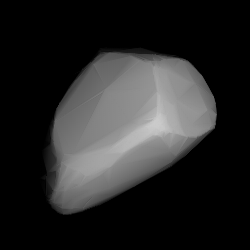Astronomy:407 Arachne
From HandWiki
Short description: Main-belt asteroid
 Modelled shape of Arachne from its lightcurve | |
| Discovery | |
|---|---|
| Discovered by | Max Wolf |
| Discovery date | 13 October 1895 |
| Designations | |
| (407) Arachne | |
| Pronunciation | /əˈrækniː/[2] |
| Named after | Arachne [1] |
| 1895 CC | |
| Minor planet category | Main belt |
| Adjectives | Arachnean /ærəkˈniːən/[3] |
| Orbital characteristics [4] | |
| Epoch 31 July 2016 (JD 2457600.5) | |
| Uncertainty parameter 0 | |
| Observation arc | 116.62 yr (42596 d) |
| |{{{apsis}}}|helion}} | 2.80706 astronomical unit|AU (419.930 Gm) |
| |{{{apsis}}}|helion}} | 2.44624 AU (365.952 Gm) |
| 2.62665 AU (392.941 Gm) | |
| Eccentricity | 0.068685 |
| Orbital period | 4.26 yr (1554.9 d) |
| Mean anomaly | 155.411° |
| Mean motion | 0° 13m 53.497s / day |
| Inclination | 7.52045° |
| Longitude of ascending node | 294.698° |
| 81.6776° | |
| Physical characteristics | |
| Dimensions | 95.07±5.4 km |
| Rotation period | 22.62 h (0.943 d)[4] |
| Geometric albedo | 0.0548±0.007[4] |
| C [4] | |
| Absolute magnitude (H) | 8.88[4] |
Arachne (minor planet designation: 407 Arachne) is a large Main belt asteroid. It is classified as a C-type asteroid and is probably composed of carbonaceous material. It was discovered on 13 October 1895, by German astronomer Max Wolf at Heidelberg Observatory.[4]
407 Arachne has been observed to occult 9 stars between 2002 and 2023.
References
- ↑ Schmadel, Lutz D. (2007). "(407) Arachne". Dictionary of Minor Planet Names – (407) Arachne. Springer Berlin Heidelberg. p. 48. doi:10.1007/978-3-540-29925-7_408. ISBN 978-3-540-00238-3.
- ↑ Noah Webster (1884) A Practical Dictionary of the English Language
- ↑ arachnean (3rd ed.), Oxford University Press, September 2005, http://oed.com/search?searchType=dictionary&q=arachnean (Subscription or UK public library membership required.)
- ↑ 4.0 4.1 4.2 4.3 4.4 4.5 "407 Arachne (1895 CC)". JPL Small-Body Database. NASA/Jet Propulsion Laboratory. https://ssd.jpl.nasa.gov/sbdb.cgi?sstr=407;cad=1.
External links
- 407 Arachne at AstDyS-2, Asteroids—Dynamic Site
- 407 Arachne at the JPL Small-Body Database
 |

